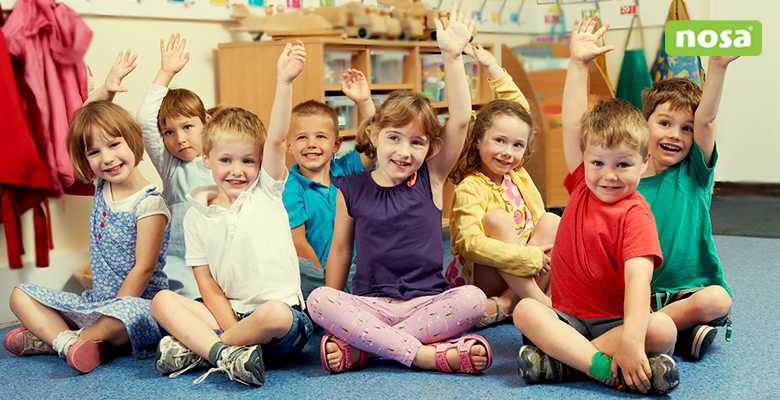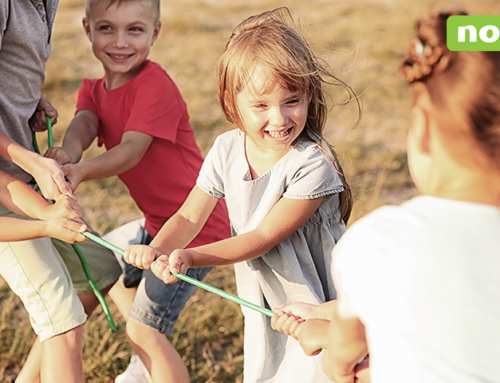Starting kindergarten should not be an unpleasant experience if we take some measures. Children's reactions to this new stage depend on how we adults manage the situation. If you are worried about your child's start at kindergarten, then today's article will be useful for you. We share expert tips to help you live happily (without drama) the first day of kindergarten.
When the baby is less than 10 months old, the process of adaptation to the nursery is easier as they are not fully aware of their situation. Between 12 and 18 months they do suffer the separation and cry a lot: from 18 months onwards they are able to understand that the separation is temporary and can enter the nursery with a little more enthusiasm.
The most difficult thing for children is to be separated from their parents and to enter a new place, with unfamiliar people and to do activities that challenge their intelligence.
Therefore, success on the first day of kindergarten depends on how well we control the unknown factors and introduce habits beforehand that make the changes easier.
What to do to start kindergarten and get him/her to adapt quickly?
Parents have a responsibility to make the first day of kindergarten a positive experience.
Fears, sadness or anguish should not be expressed because the child will nurture these emotions and everything becomes complicated. Even if you feel guilty, even if you believe that no one cares for him better than you.... nursery is a subject you should talk about in a positive and enthusiastic way.
Tactics change according to the age of the child. Let's talk about each one of them 😉
Starting kindergarten at 8 months
If less than eight months old the child senses your absenceAlthough not overtly so. Limit hours in day care to a minimum. Leave a toy from home and a piece of clothing that smells like you in the cot.
When you have him at home, increase the proximity. Give him more cuddles. Give him lots of hugs and kisses. Talk sweetly and soothe him. If you notice any changes (irritability, insomnia...) and these persist for more than three weeks, we advise you to check with the centre what is going on.
Starting kindergarten at more than 12 months of age
When it is more than one year old their reactions are more intense if he/she perceives the threat of separation. Give him/her time to become familiar with the centre and the educator.
It is recommended that you play with him or her in the nursery. Take the opportunity to introduce him or her to the space. Explain all the good things that await him or her there. Try leaving him/her for a few hours (1 or 2) and observe his/her reactions. Say goodbye briefly. Tell her the truth about why you are leaving and the time you will be back.
Never sneak away and leave him or her entertained by the games. When your child senses that you are far away, he will cry more and rightly so. This kind of behaviour scares them and makes them insecure.
When you pick him up, double your attention and affectionate gestures. Speak positively about the nursery, the educators and the other children. Congratulate him and show enthusiasm for this new experience.. If the child remains sad, quiet or elusive, give him/her time to digest the change and emotions.
Starting kindergarten at over 2 years of age
At this age better understand temporary separations and have more autonomy. As in the previous cases, a progressive approach is advisable.
Remember that your best ally is the educator. Pay attention to their recommendations. Ask about the child's activities and what you can do at home to make him/her happier the next day.
If during the day falls, blows or accidents occurredBe careful how you express yourself to your son or daughter. Always discuss these incidents in private with the educator. And when you get home, while you are pampering your child, use some of our products. Nosa for the relief from bruises and bumps .
We insist: after a day at the day care centre be kinder and more understanding than ever. These are emotionally strong days for everyone.
Another important aspect is to avoid rushing. Try to make the mornings relaxed: give him or her time to wake up, have breakfast together, dress him or her in comfortable clothes that he or she likes. Then in the street, turn the journey into a walk, so that you don't have to run or pull him or her through the streets.
You are the most important reference for your children And at that stage, what you don't put into words they perceive through your body language. Children observe and create empathy with your emotions. Therefore, it is important that you prepare yourself to let go of insecurity, grief, guilt and fears.
Your actions leave their mark on your children. Be aware of what you do and say, so you can help them more.







Leave A Comment
You must be logged in to post a comment.